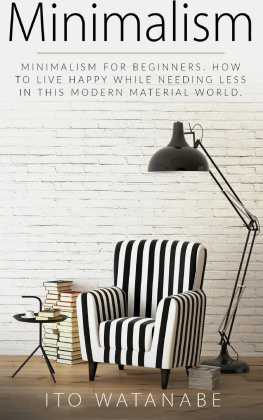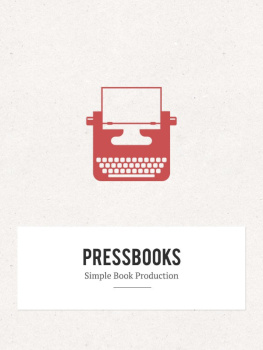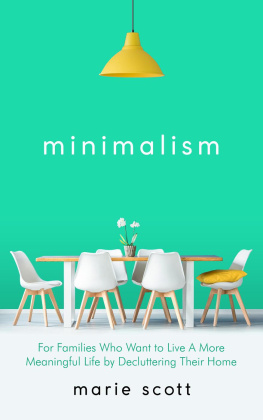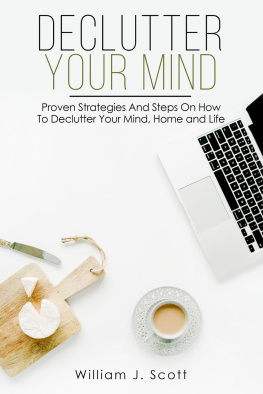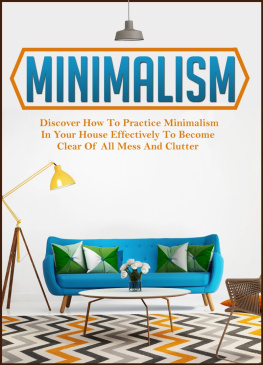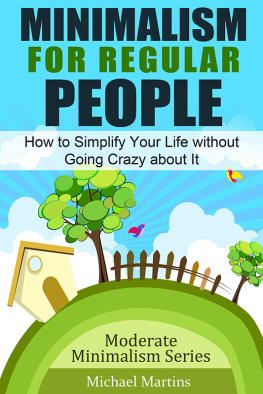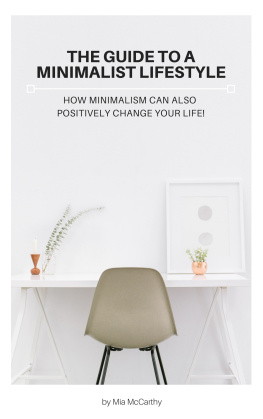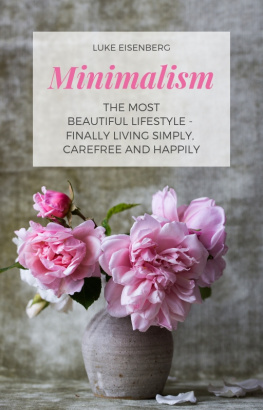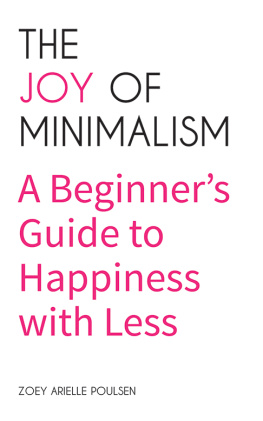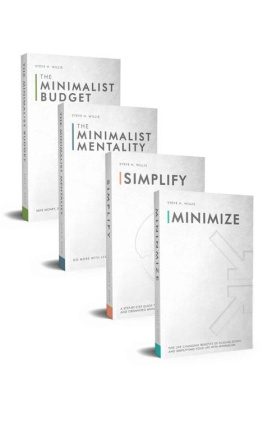Ito Watanabe - Minimalism: Minimalism for Beginners. How to Live Happy While Needing Less in This Modern Material World
Here you can read online Ito Watanabe - Minimalism: Minimalism for Beginners. How to Live Happy While Needing Less in This Modern Material World full text of the book (entire story) in english for free. Download pdf and epub, get meaning, cover and reviews about this ebook. year: 2020, publisher: Creative Minds Publishing, genre: Home and family. Description of the work, (preface) as well as reviews are available. Best literature library LitArk.com created for fans of good reading and offers a wide selection of genres:
Romance novel
Science fiction
Adventure
Detective
Science
History
Home and family
Prose
Art
Politics
Computer
Non-fiction
Religion
Business
Children
Humor
Choose a favorite category and find really read worthwhile books. Enjoy immersion in the world of imagination, feel the emotions of the characters or learn something new for yourself, make an fascinating discovery.
- Book:Minimalism: Minimalism for Beginners. How to Live Happy While Needing Less in This Modern Material World
- Author:
- Publisher:Creative Minds Publishing
- Genre:
- Year:2020
- Rating:3 / 5
- Favourites:Add to favourites
- Your mark:
Minimalism: Minimalism for Beginners. How to Live Happy While Needing Less in This Modern Material World: summary, description and annotation
We offer to read an annotation, description, summary or preface (depends on what the author of the book "Minimalism: Minimalism for Beginners. How to Live Happy While Needing Less in This Modern Material World" wrote himself). If you haven't found the necessary information about the book — write in the comments, we will try to find it.
Imagine having more time and energy to do what you love. Minimalism will help you reduce your stress levels, pointless distractions and even improve your overall mental health, well-being and happiness.
Do you want to live a simpler way of life? Are you tired of all the clutter around you? Are you finally realizing that owning more stuff does not equate to happiness? Our modern world has put us in a place where we are constantly on the run.
We think that we need to keep up with our neighbors, that we need to purchase as many items as possible in order to be happy. Nothing could be further from the truth. With minimalism, you can be happy without purchasing all these items. In fact, the less you have, the better!
Here is what you will learn in this book:-
- What is Minimalism?
- The Advantages of Using Minimalism in Your Life
- Easy Ways to Start Using Minimalism In Your Life
- The Problem with Clutter
- Going Through Your Home and Decluttering
- How to Maintain a Minimalist Home
- Minimalism and Your Health
- The Secret to applying Minimalism without losing your friends
- Money management tips for a successful Minimalist lifestyle
- Can Managing Technology Help You on Your Minimalist Lifestyle?
- How to Cultivate a Minimalist Mindset
- Starting with Your Own Stuff
- Different Methods of Organizing and Decluttering That You Can Use
- Tips to Help You Implement Minimalism Into Your Daily Life for the Long Term
- The only thing you need to do daily for your Minimalism lifestyle to be a success long term!
Edward Norton, Leonardo DiCaprio and Meg Ryan are just a few on the celebrities who have publicly announced their love for the minimalism lifestyle and dcor.
After a census it was discovered that the average household has around 300,000 items and that only a quarter of it is useful or even needed. That makes it hard to find the things you actually need when you need it.
In fact research has shown that the average person spends 12 days per year looking for things they cant find around their own house.
Even if you tried other Minimalism books for beginners and failed, you will succeed in implementing the tips and strategies with this one because we focus on the long term and hold your hand every step of the way.
So if you want to decrease your stress levels and improve your overall well-being and happiness while saving money then click add to cart and start your Minimalism journey today!
Ito Watanabe: author's other books
Who wrote Minimalism: Minimalism for Beginners. How to Live Happy While Needing Less in This Modern Material World? Find out the surname, the name of the author of the book and a list of all author's works by series.

